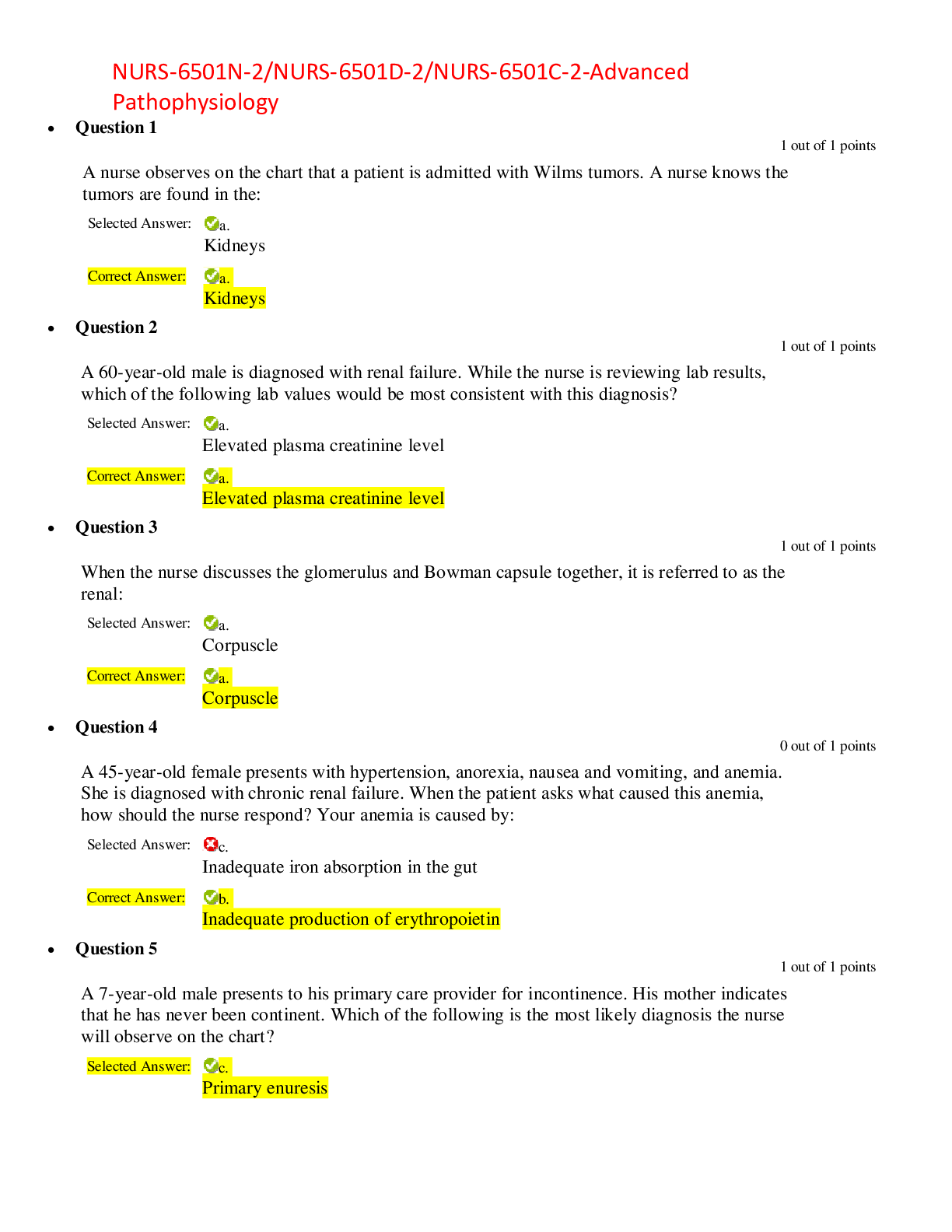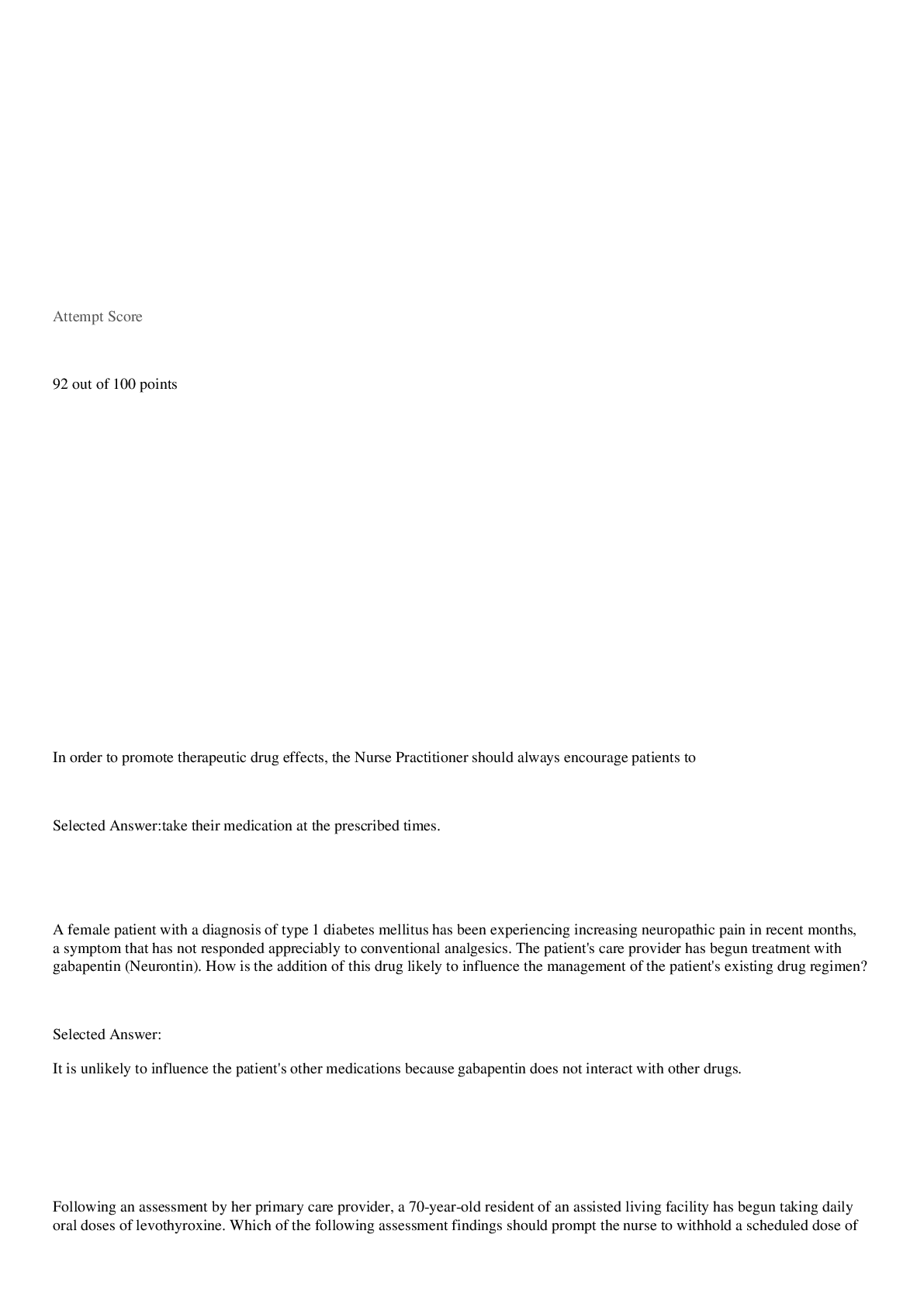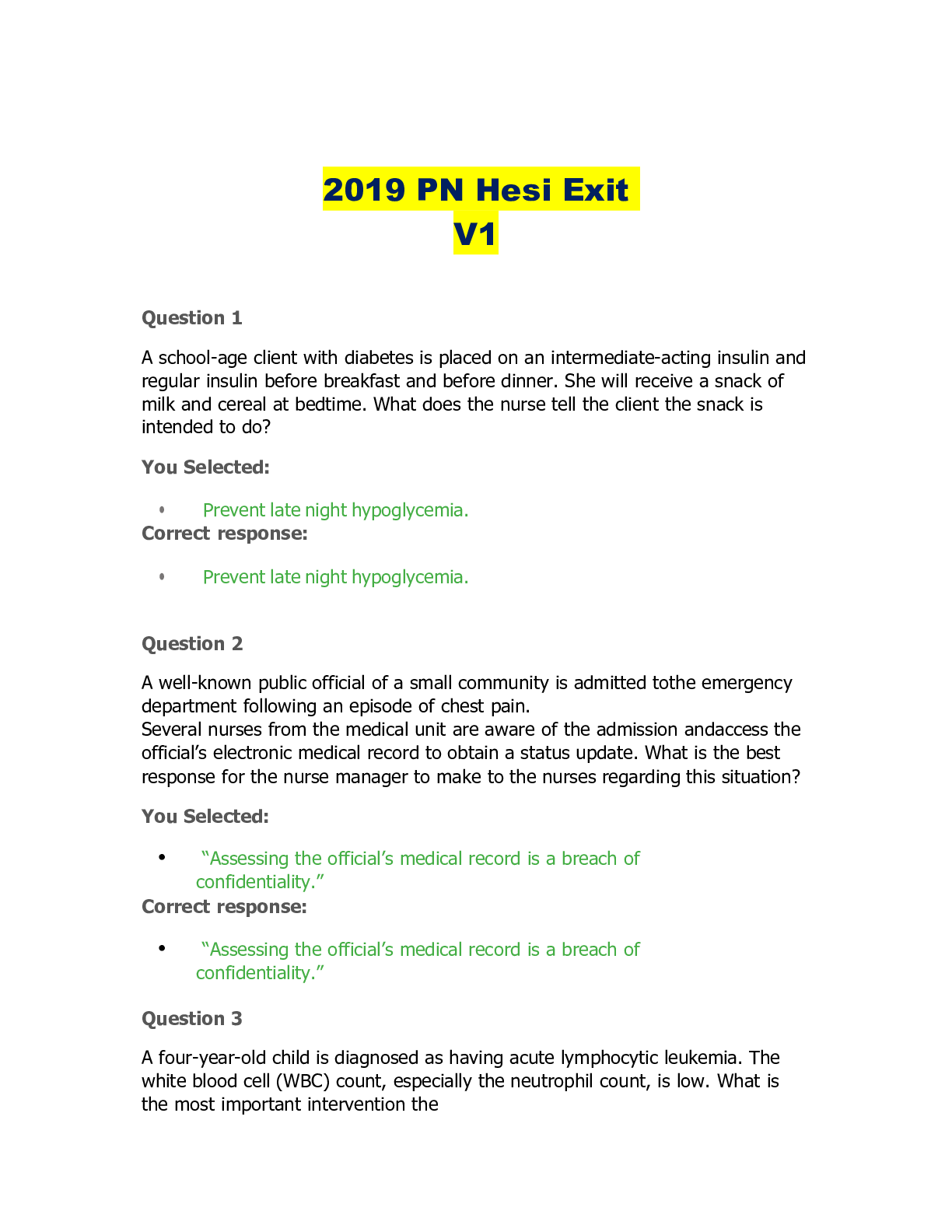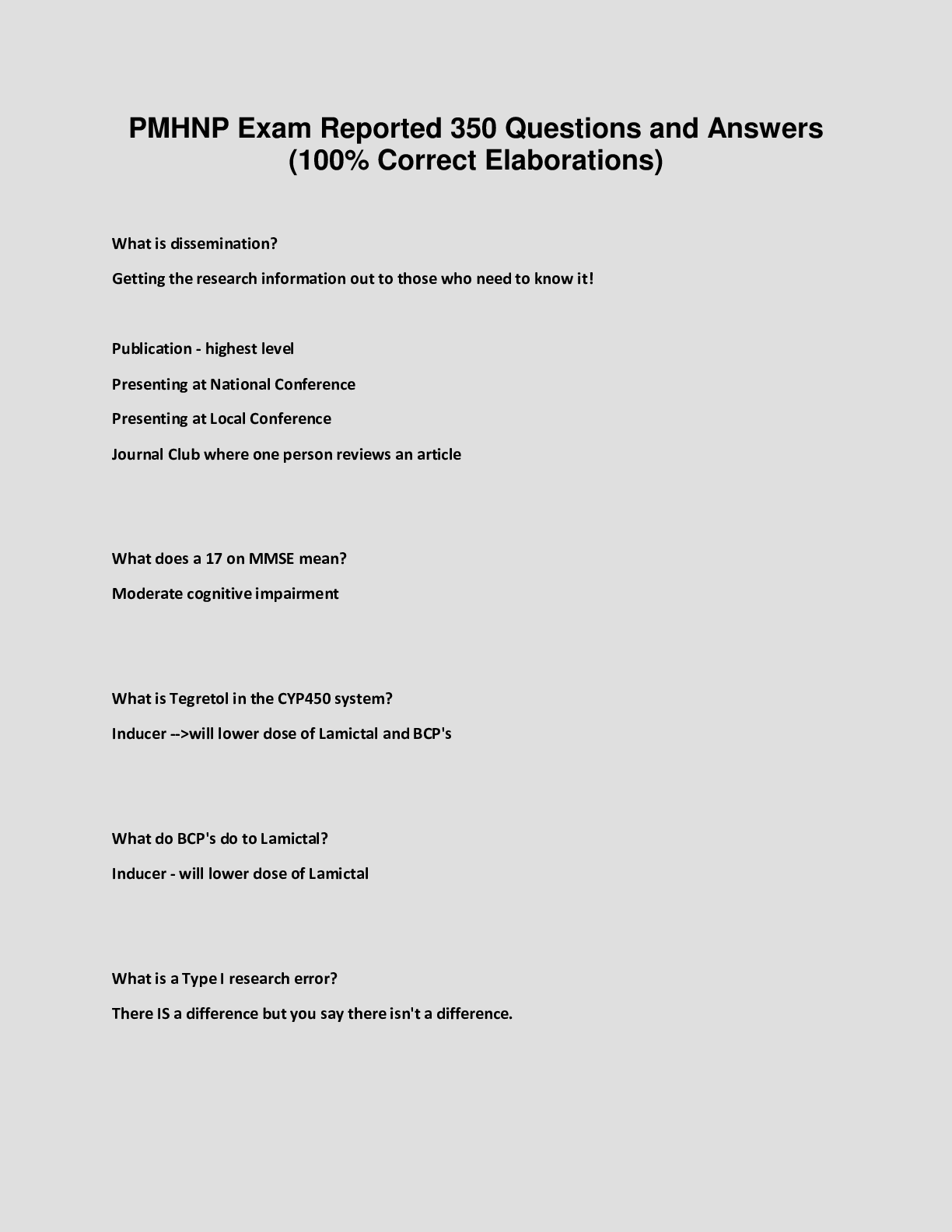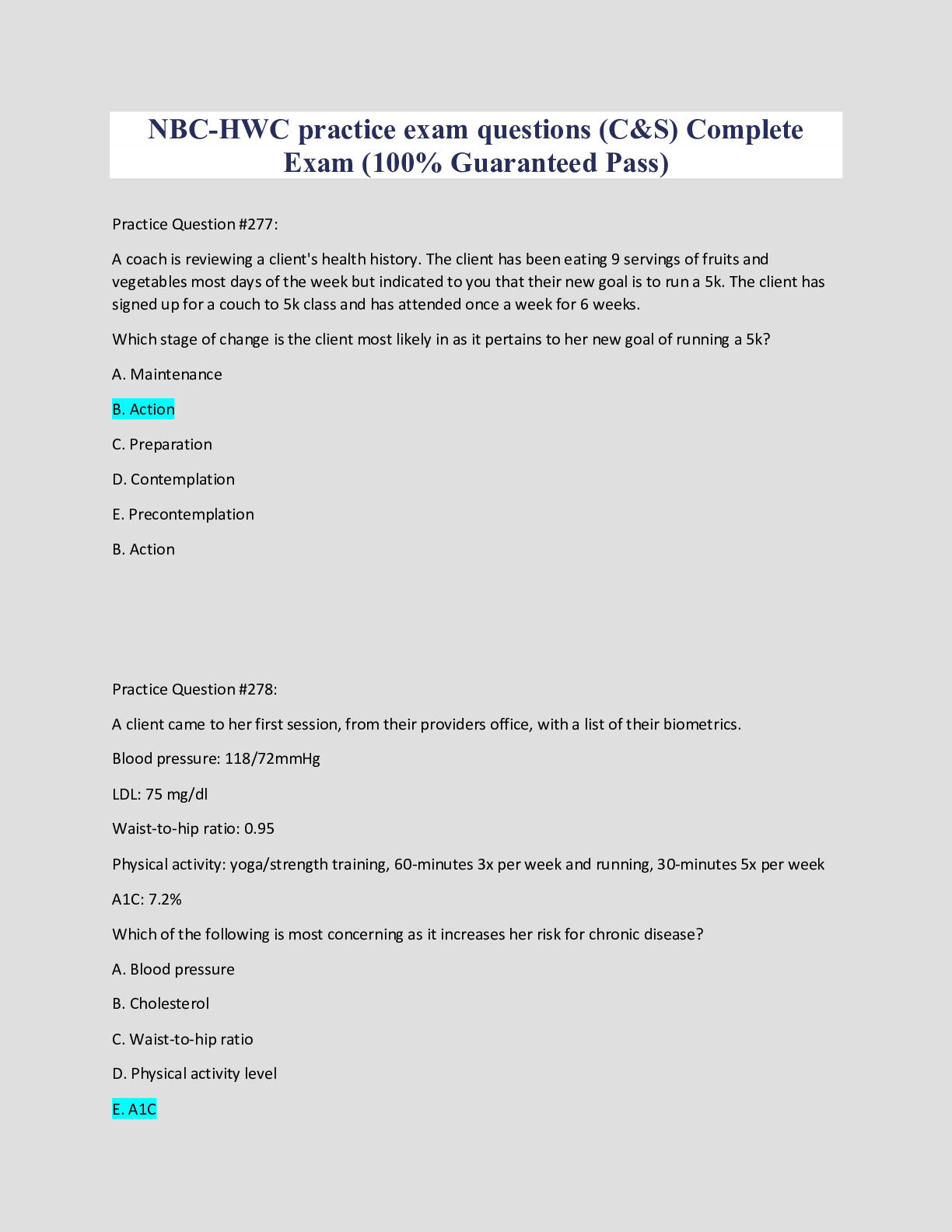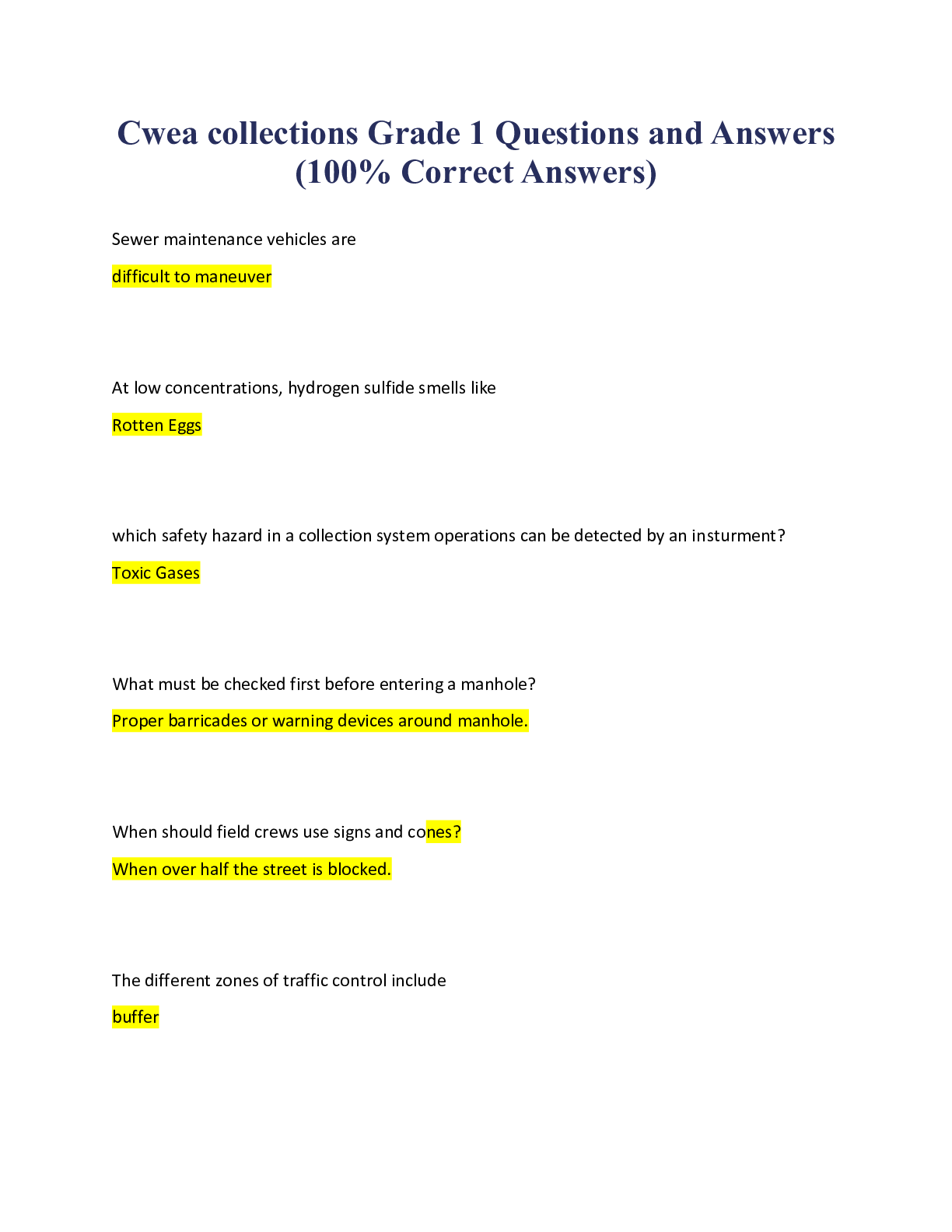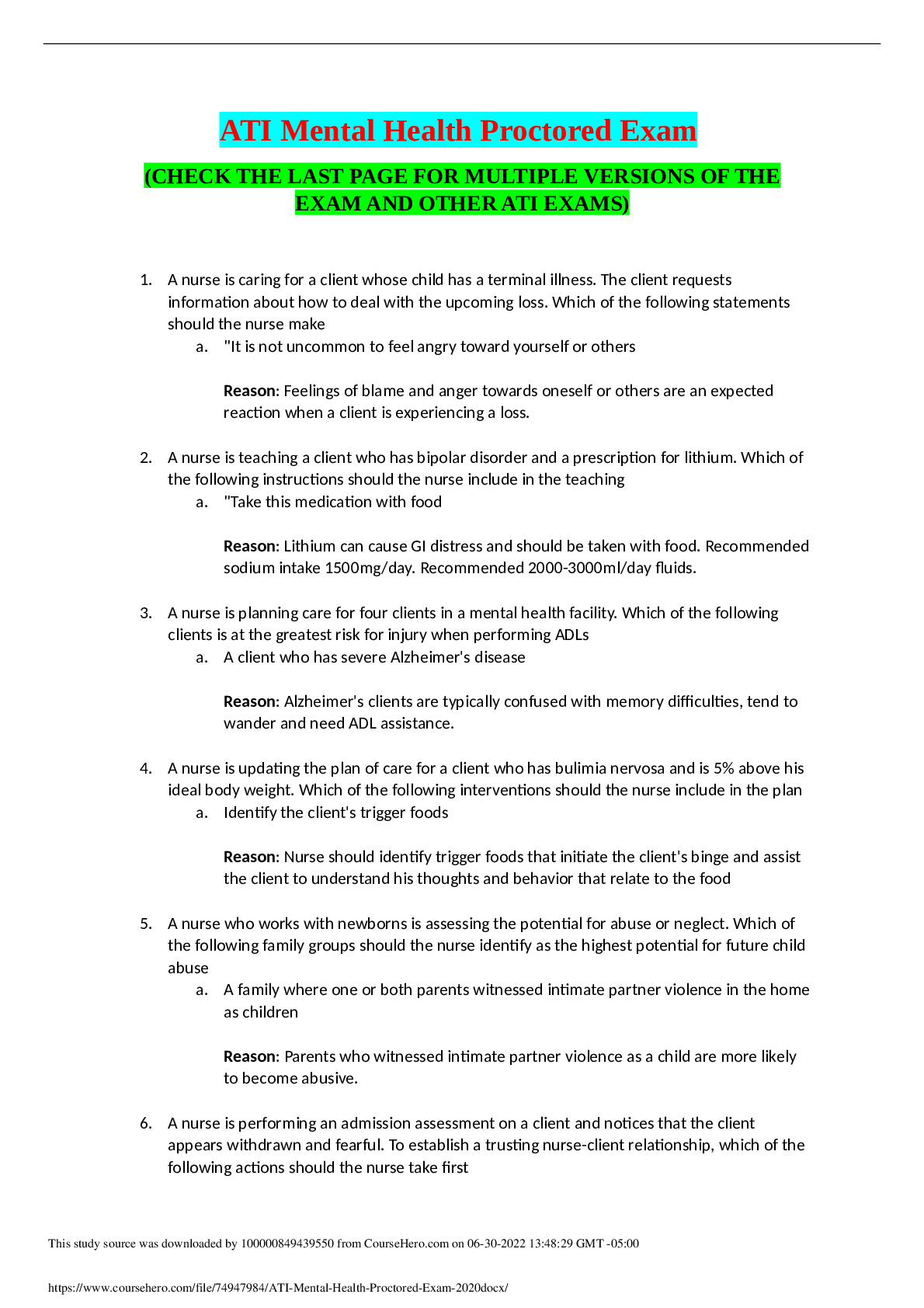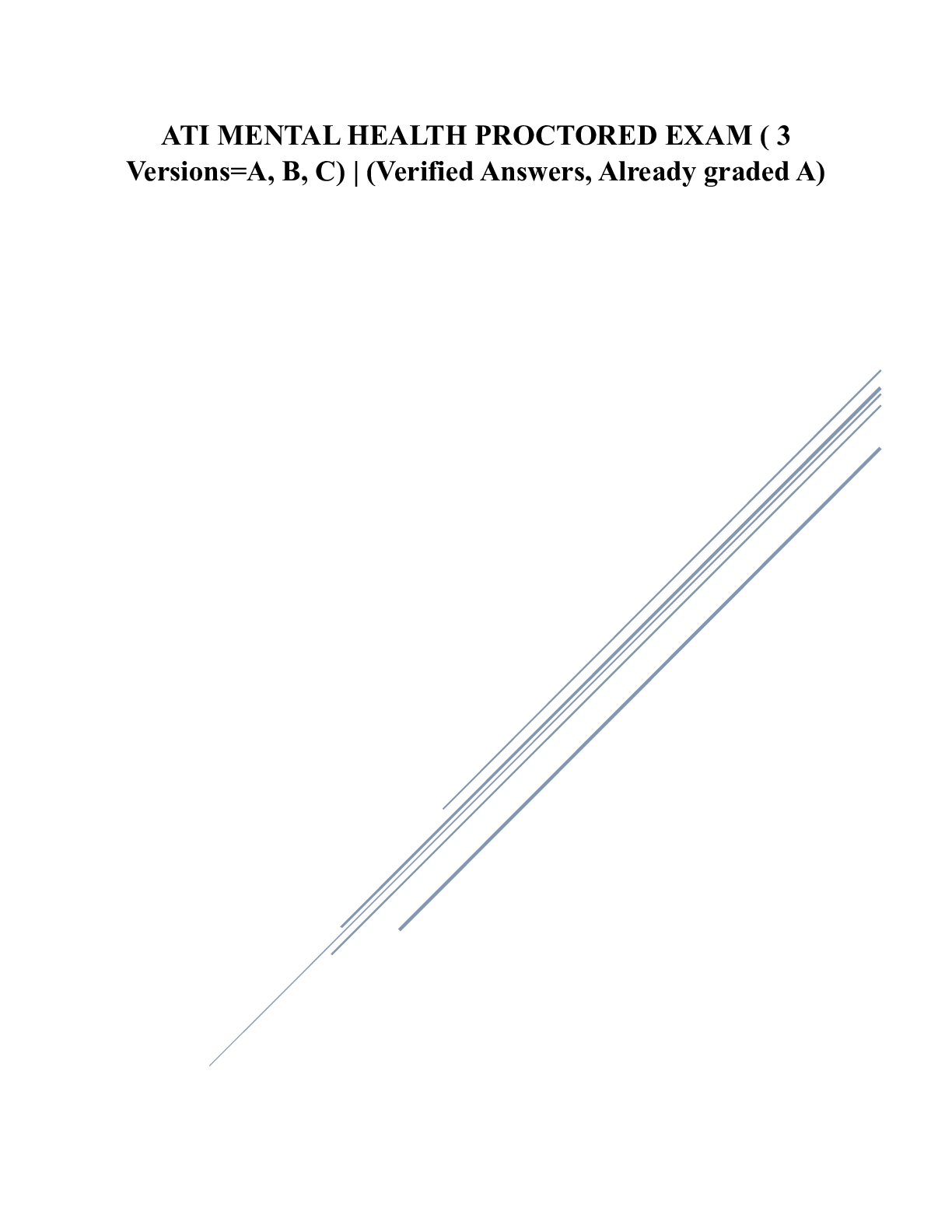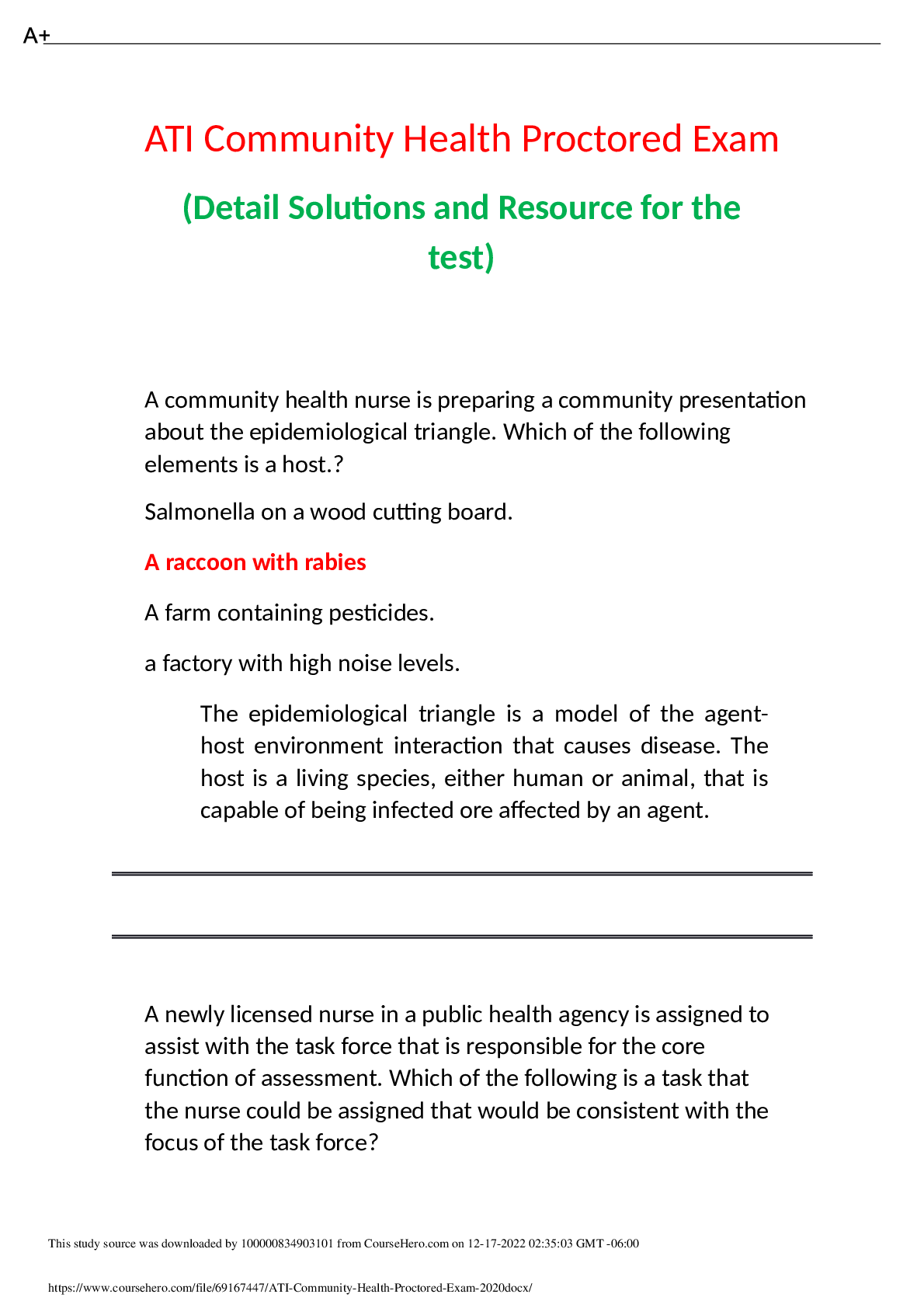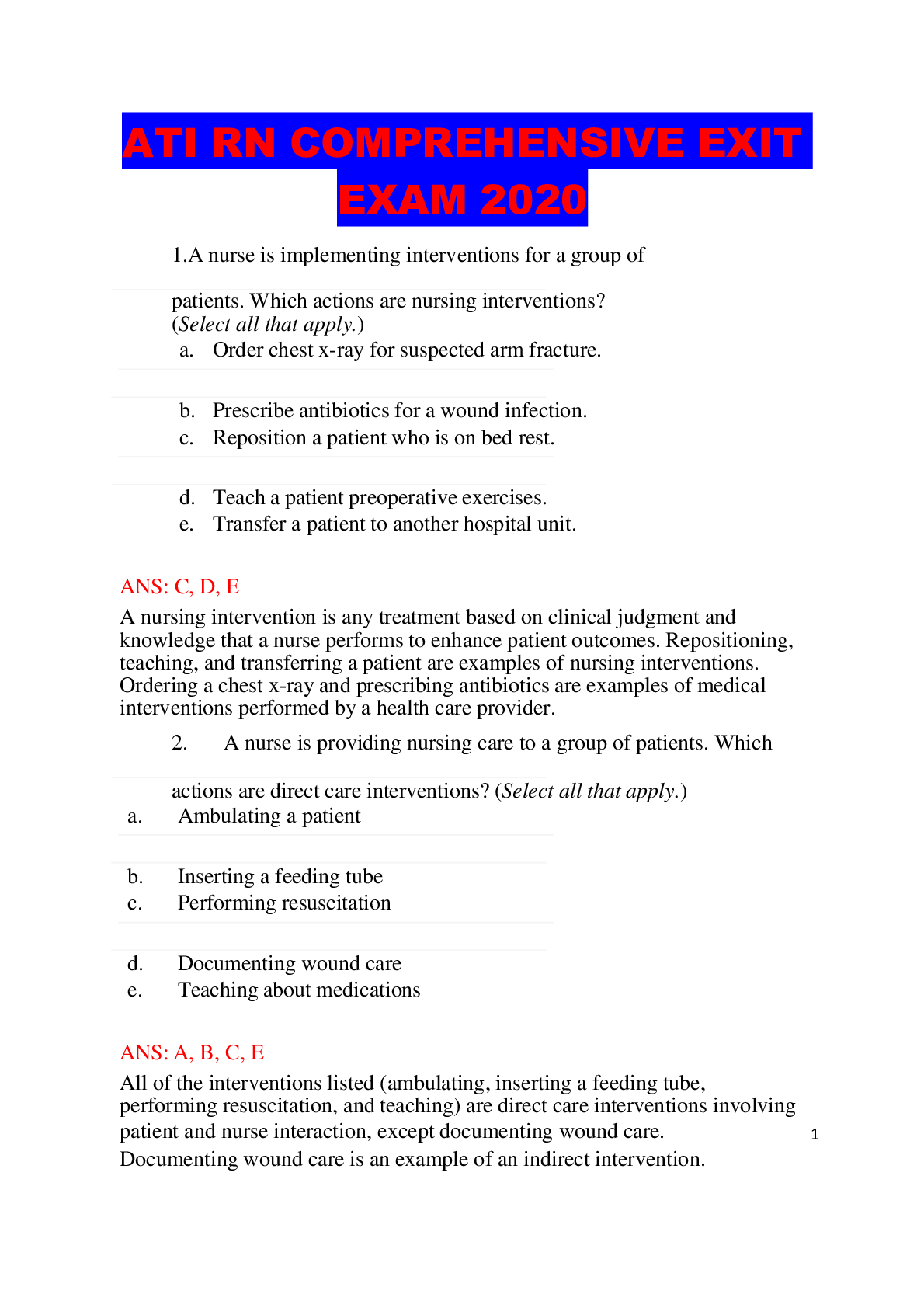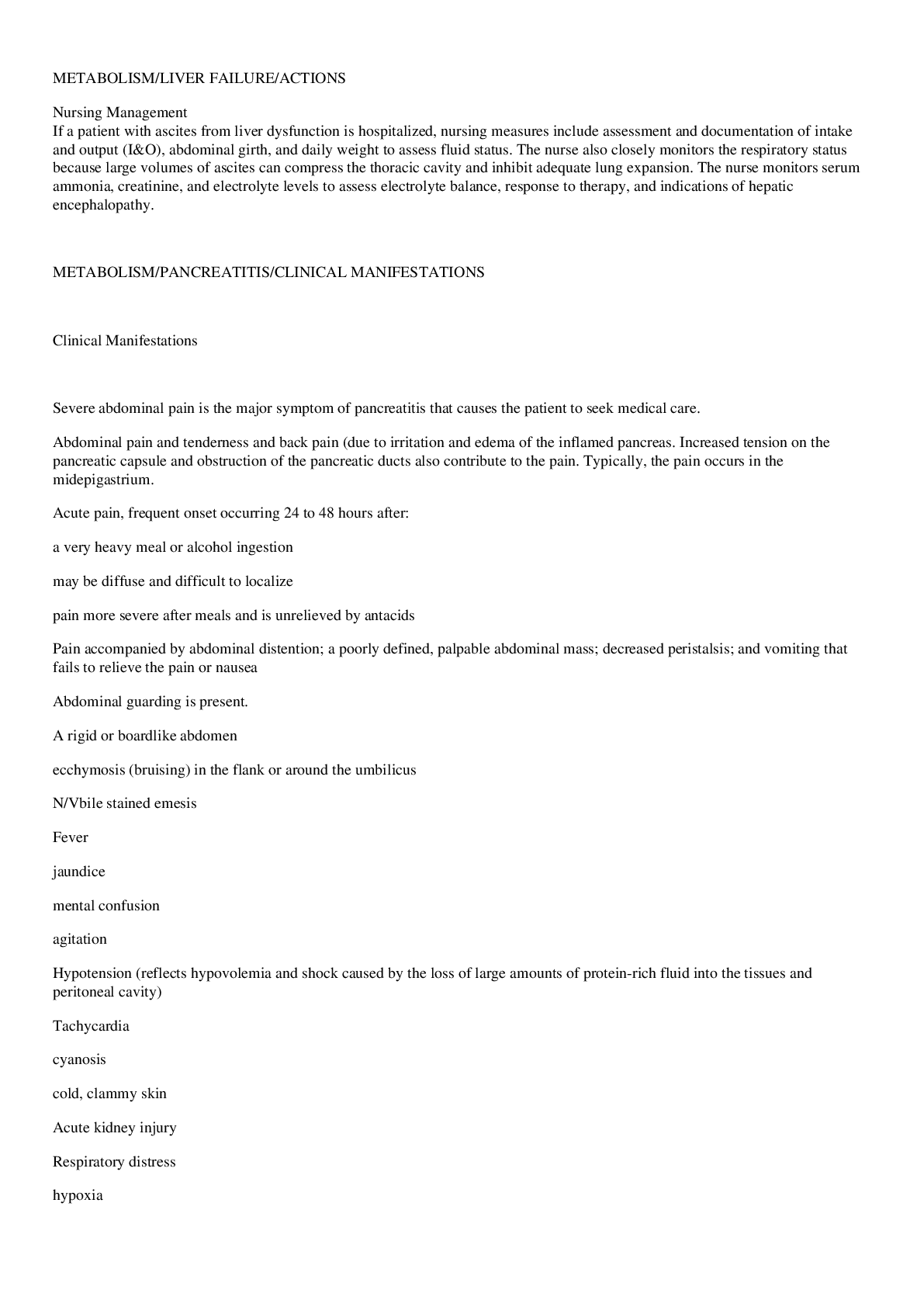*NURSING > EXAM > ATI Mental Health Proctored Exam , Verified Correct Answers | TOP SCORE GUARANTEED. (All)
ATI Mental Health Proctored Exam , Verified Correct Answers | TOP SCORE GUARANTEED.
Document Content and Description Below
ATI Mental Health Proctored Exam 1. A nurse is caring for a client who has cirrhosis of the liver due to alcohol use disorder. Which of the following findings should the nurse suspect? - Acrocyanosis ... - Arrhythmias - Ascites * - Weight gain 2. A nurse is collecting data from a client who has binge- eating disorder. Which of the following findings should the nurse expect? - Amenorrhea - Abdominal pain * - Restricted caloric intake - Frequent use of laxatives 3. A nurse is assisting with the collection of admission data for a client who has anorexia nervosa. The client has lost 11.4 kg (25 lb) over the past month and currently weighs 38.6 kg (85 lb). The nurse should expect which of the following findings? - Flushed extremities - Hyperkalemia - Loose stools - Amenorrhea * 4. A nurse is caring for a client who has alcohol use disorder. Following withdrawal, which of the following medications should the nurse expect to administer to the client during maintenance? - Methadone - Disulfiram * - Chlordiazepoxide - Naloxone 5. A nurse is collecting data from a client who has post-traumatic stress disorder (PTSD) due to a sexual assault that occurred 3 months ago. Which of the following findings should the nurse expect? - Increased hours of sleep each day - Repeatedly talking about the assault - Dreams about the assault * - Decreased responsiveness to stimuli 6. A nurse in an acute mental health facility is participating in a nursing staff discussion about the legal aspects of involuntary admissions. Which of the following information should the nurse include? - A client who is involuntarily admitted must take prescribed medications - An involuntary admission of a client is limited to 2 weeks - A client who is involuntarily admitted can leave the facility against medical advice - An involuntary admission is justified if the client is a danger to others * 7. A nurse in a mental health unit is contributing to the plan of care for a client who is receiving treatment for self-inflicted injuries. The nurse should identify which of the following interventions as the priority for this client. - Promoting and maintaining the client safety * - Discussing reasons for the client’s behavior - Assisting the client to recognize feelings - Reinforcing teaching with the client about alternative coping strategies 8. A nurse in an acute mental health facility is assisting with the plan of care for a client who has obsessive-compulsive disorder (OCD). Which of the following actions should the nurse recommend? - Encourage the client to focus on personal hygiene - Limit the hours the client sleeps each day - Instruct the client to practice thought stopping * - Make negative statements about the client’s behavior 9. A nurse is reinforcing teaching with a client who has bipolar disorder and a new prescription for valproic acid. The nurse should explain that the provider will routinely prescribe which of the following tests while the client is taking valproic acid? - Electrocardiogram - Chest X-ray - Thyroid function tests - Liver function levels * 10. A nurse in the emergency room is collecting data from a client who has heroin intoxication. Which of the following findings should the nurse expect? - Seizure activity - Respiratory depression * - Hypersensitivity to pain - Increased mental alertness 11. A nurse is assisting with a community presentation about Alzheimer’s disease. The nurse should conclude that a member of the group requires further reinforcement of teaching when she identifies which of the following findings as a manifestation of Alzheimer’s disease? - Impaired judgment - Sudden confusion * - Decreased attention span - Short-term memory loss 12. A nurse is collecting data from a client who has cocaine intoxication. Which of the following findings should the nurse expect? - Low blood pressure - Increased mental alertness * - Flat affect - Decreased body temp 13. A nurse is assisting with the admission of a client who has antisocial personality disorder to an acute care unit. The client is admitted under court order following the theft and destruction of a car. Which of the following behaviors should the nurse expect the client to display? - Relief about finally receiving care for a problem for which he was previously afraid to ask for help - Anger with the nursing staff for hospitalizing him against his will * - Withdrawal from others due to shame over his recent actions - Remorse for stealing and destroying the car 14. A nurse is contributing to the plan of care for a client who has anorexia nervosa. The nurse should identify that which of the following actions is contraindicated for this client? - Explaining that tube feedings are necessary if the client refuses oral intake - Weighing the client each day prior to any oral intake - Permitting the client to spend some quiet time alone after each meal * - Refraining from commenting on what the client is eating during mealtime 15. A nurse is contributing to the plan of care for a client who has physical dependence to alprazolam and must discontinue the medication. Which of the following actions should the nurse recommend? - Taper the medication gradually over several weeks * - Encourage participation in stimulating physical activity - Monitor the client for a return of anxiety for up to 72 hrs following discontinuation of the medication - Implement restraints and seclusion as needed 16. A nurse is preparing to administer a benzodiazepine to a client who has generalized anxiety disorder. The nurse should tell the client to expect which of the following adverse effects? - Tinnitus - Bradycardia - Halitosis - Sedation * 17. A nurse is collecting data from a client who takes an MAOI for the treatment of depression. Which of the following findings is the priority for the nurse to report to the provider? - Elevated BP * - Weight gain - Muscle twitching - 2+ peripheral edema 18. A nurse in an acute substance disorder unit is collecting data from a client who received treatment in the emergency department for an opioid overdose. Which of the following findings should the nurse anticipate during opioid withdrawal? - Calmness - Anxiety * - Hypotension - Bradycardia 19. A nurse is reinforcing teaching with a client who has generalized anxiety disorder and a new prescription for buspirone. The nurse should inform the client that which of the following manifestation is an adverse effect of this medication? - Oliguria - Tinnitus - Dizziness * - Insomnia 20. A nurse is collecting data from a client who has moderate cognitive decline due to Stage 4 Alzheimer’s Disease. Which of the following findings should the nurse expect? - Requires assistance with eating - Frequently gets lost due to wandering - Has bladder incontinence - Able to identify names of family members * 21. A nurse is caring for a client who just received a terminal diagnosis of cancer. Which of the following initial reactions should the nurse expect form the client? - Bargaining - Depression - Denial * - Anger 22. A nurse is reviewing the medical record of a client who has a new prescription for a benzodiazepine. For which of the following findings should the nurse question the provider’s prescription? - A skeletal muscle injury - History of status epilepticus - Hypotension * - Insomnia 23. A nurse is caring for a client who attends family counseling with his partner and their children. The client tells the nurse that he isn’t going to attend any further sessions and states, “I don’t have time for all that talking.” Which of the following responses should the nurse make? - It must be difficult for you to talk about family problems * - You should continue attending the family counseling sessions until the therapist tells you to stop - If you continue to go to family counseling, I’m sure you’ll be able to resolve your family problems soon - I think you need to continue family therapy if your partner and children want to receive further counseling 24. A nurse is assisting in the planning of a staff education session about the administration of antidepressant medications to older adult clients. Which of the following information should the nurse recommend to include? - Older adult clients require a lower initial dose of antidepressant medication than adult clients * - Older adult clients should not receive antidepressant medication - Older adult clients achieve the therapeutic effects of antidepressant medications more quickly than adult clients - Older adult clients have decreased risk for adverse effects from antidepressant medication 25. A nurse in an acute mental health facility is reviewing the medication records for a group of clients. The nurse should expect a prescription for memantine for a client who has which of the following diagnoses? - Depression - Schizophrenia - Obesity - Alzheimer’s disease * 26. A nurse is caring for a client who has Alzheimer’s disease and a new prescription for donepezil. Which of the following actions should the nurse take? - Monitor the client’s liver function while taking this medication - Increase the dosage of the medication every 72 hrs - Off the client a PRN aspirin while taking this medication - Administer the medication at bedtime * 27. A nurse is collecting admission data from a client who has anorexia nervosa. Which of the following findings should the nurse expect? - Poor personal hygiene habits - Strenuous exercise regimen * - Grandiose behaviors - Intense fear of death 28. A nurse is reinforcing teaching with a client who has agoraphobia about systematic desensitization. Which of the following comments should the nurse include in the teaching? - You will watch from a secure location as your therapist goes to public spaces - You will start your therapy by staying in a public space until your anxiety decreases - You will be instructed to say “stop” out loud when you become anxious in public spaces - You will slowly be exposed to increasing levels of public spaces * 29. A nurse on an acute care unit is providing postoperative care to an older adult client who develops delirium. Which of the following actions should the nurse take? - Withhold PRN anti-anxiety medication - Provide the client with a stimulating activity prior to bedtime - Keep the client’s room well- lit at night * - Encourage the client to make decisions about her daily routine 30. A nurse is reviewing the medical history of a client who has a new prescription for electroconvulsive therapy (ECT). Which of the following findings should the nurse identify as the priority? - Severe depression - Cardiac arrhythmia * - Bipolar disorder - Parkinson’s disease 31. A nurse is collecting data from an older adult client about possible abuse by her caregiver. Which of the following techniques should the nurse use? - Avoid directly asking the client if she has been abused - Use the confrontational approach - Maintain a nonjudgmental tone * - Avoid being in the room alone with the client 32. A nurse is caring for a client who has depression. The client states, “I am too tired and depressed to attend group therapy today.” Which of the following responses should the nurse make? - Attend group therapy, even if you’re tired, is an important part of your treatment * - That’s okay if you’re tired to attend group therapy today, but you will have to go tomorrow - It is normal to feel tired when you’re feeling depressed. The others in group therapy also feel this way - I agree with your decision to wait for participation in group therapy until you begin to feel better 33. A nurse is reviewing the medications of a client who has bipolar disorder and a new prescription for lithium. The nurse should identify that it is sage to administer which of the following medications while the client is taking lithium? - Ibuprofen - Haloperidol - Valproic acid * - Hydrochlorothiazide 34. A nurse is collecting data from a toddler who has a fractured arm. Which of the following findings should the nurse identify as a possible indication of physical abuse? - The parent provides a history that is inconsistent with the child’s injury * - The child is brought to the health care facility immediately following the injury - The parent requests to remain present with the child throughout treatment of the injury - The child clings to the parent when the nurse begins to examine the injury 35. A nurse is assisting to evaluate the plan of care for a client who has antisocial personality disorder. Which of the following client actions indicates that he is making progress with the treatment? (select all that apply) - Assisting another client who has depression to fill out a menu * - Nominating himself to chair the client government meeting - Requesting a weekend pass to go home * - Serving as the judge for a unit talent show - Informing the nurse that the staff provides excellent care to clients 36. A nurse is caring for a newly admitted client who is receiving treatment for alcohol use disorder. The client tells the nurse, “I have not had anything to drink for 6 hrs.” Which of the following findings should the nurse expect during alcohol withdrawal? - Low body temp - Insomnia * - Muscle flaccidity - Bradycardia 37. A nurse is caring for a client who has Alzheimer’s disease and becomes agitated while refusing morning hygiene care. Which of the following actions should the nurse take? - Talk to the client from two arm-lengths away * - Obtain assistance to restrain the client for safety - Firmly state to the client that morning care will be performed - Call the provider to request a prescription for antipsychotic medication 38. A nurse is caring for a client who has bipolar disorder and is experiencing a manic episode. Which of the following actions should the nurse take? - Discourage the client from taking naps during the day - Allow the client to choose which clothing to wear each day - Encourage the client to participate in group therapy - Provide the client frequently with high-calorie finger-foods * 39. A nurse is reinforcing teaching with a client who has a new prescription for disulfiram for the management of alcohol dependence. Which of the following dietary choices should the nurse instruct the client to avoid? - Peppermint candy - Pure vanilla extract * - Salt - Chocolate 40. A nurse is caring for a client who is receiving treatment for alcohol detoxification. Which of the following medications should the nurse expect to administer during this phase of the client’s care? - Buprenorphine - Diazepam * - Varenicline - Rimonabant 41. A nurse is caring for a client who has schizophrenia. The nurse notices that the client is pacing up and down the hall very rapidly and mutter in an angry manner. Which of the following actions should the nurse take first? - Apply mechanical restraints on the client - Administer PRN haloperidol IM to the client - Approach the client in a nonthreatening manner * - Place the client in seclusion 42. A nurse is caring for a client who has major depressive disorder and is severely withdrawn. Which of the following techniques should the nurse use to facilitate communication with the client? - Continue to talk to the client does not provide an immediate verbal response - Use platitudes when talking with the client - Ask the client direct questions - Speak to the client using simple and concrete terminology * 43. A nurse is caring for a client who reports that the television set in the room is really a two-way radio and states, “Voices are coming from the TV and everything we say in this room is being recorded.” Which of the following responses should the nurse make? - What we say is not being recorded - Let’s ignore the voices and talk about something else - That must be very frightening * - Why do you think the TV is a two-way radio 44. A nurse is collecting data from a client who has a conduct disorder. Which of the following findings should the nurse expect? - Fearfulness of authority figures - Flat affect - Preoccupation with enforcing rules - Aggressive behavior towards others * 45. A nurse in a substance use disorder treatment facility is reviewing the medication records for a group of clients. The nurse should expect to administer methadone for a client who has a substance use disorder for which of the following subtances? - Amphetamines - Opiates * - Barbiturates - Hallucinogenics 46. A nurse is reinforcing teaching with the parents of a school-0age child who has attention deficit hyperactivity disorder (ADHD). Which of the following instructions should the nurse include? - Ignore your child’s attention-seeking behaviors that are not dangerous * - Administer ADHD medications within 30 min of your child’s bedtime - Continue with an activity as planned even if your child becomes frustrated - Expect your child to gain weight after starting ADHD medications 47. A nurse is contributing to the plan of care for a newly admitted client who has bipolar disorder and is experiencing acute mania. Which of the following client goals should the nurse identify as the priority? - Practicing problem solving skills - Understanding of medication regimen - Identifying indications of relapse - Maintaining adequate hydration * 48. A nurse is reinforcing teaching with the family of a client who has Alzheimer’s disease about donepezil. Which of the following statements should the nurse include? - Donepezil can improve cognitive functioning during the earlier stages of the disease * - Donepezil cures the disease process if it is started upon first recognition of dementia - Donepezil provides long term reversal of memory loss in the last phase of the brain disease - Donepezil accelerates the breakdown of acetylcholine within the client’s brain 49. A nurse in an acute mental health facility is caring for a client who is experiencing an acute manic episode. Which of the following actions is the nurse’s priority? - Maintain the client’s contact with her family - Discourage the client’s use of vulgar language - Protect the client form impulsive behavior * - Redirect excessive energy to creative tasks 50. A nurse is contributing to the plan of care for a client who has borderline personality disorder and self-mutilates. Which of the following treatment approaches should the nurse recommend? - Restrict participation in group therapy sessions - Establish consequences for self-mutilation - Maintain close observation of the client * - Provide an unstructured environment [Show More]
Last updated: 1 year ago
Preview 1 out of 9 pages
Instant download
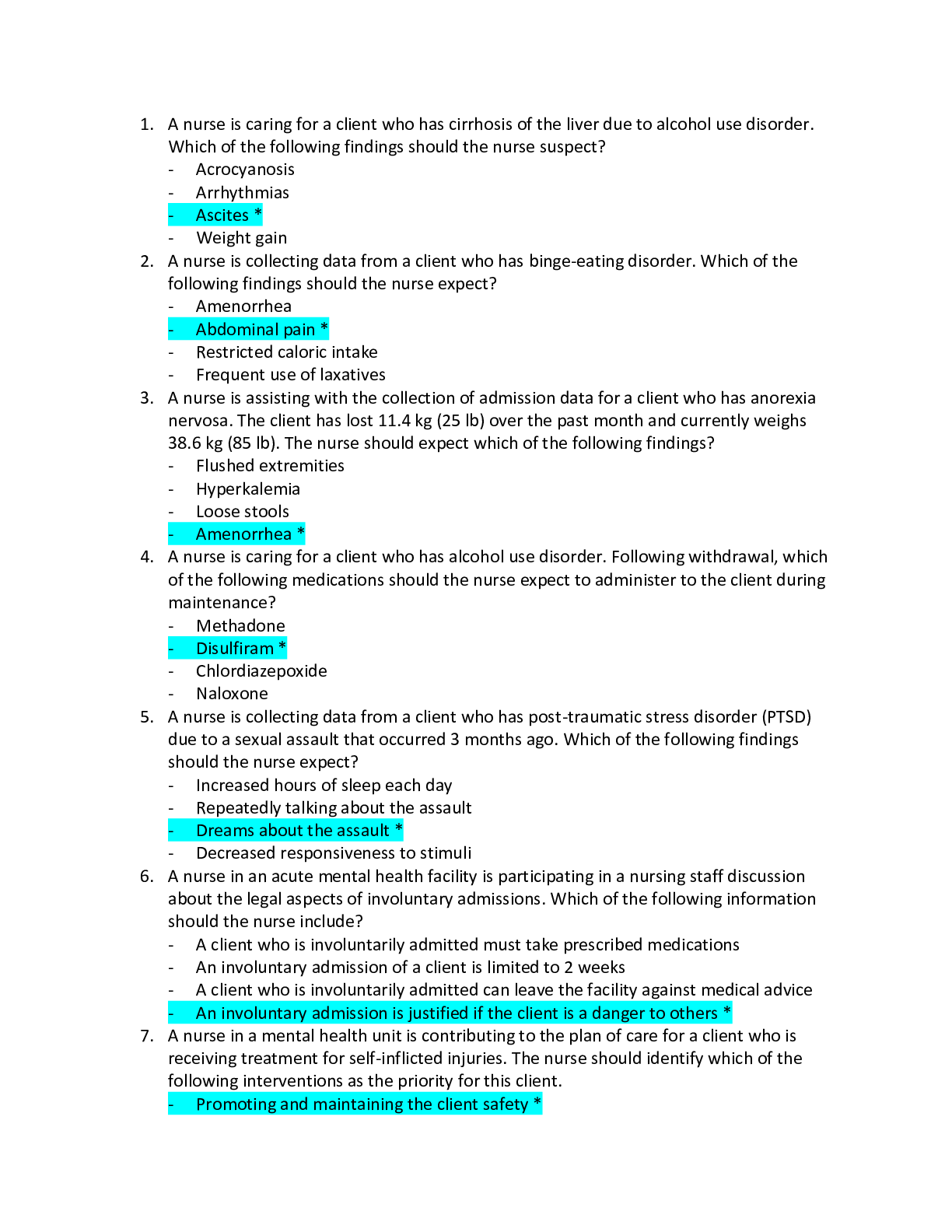
Buy this document to get the full access instantly
Instant Download Access after purchase
Add to cartInstant download
Reviews( 0 )
Document information
Connected school, study & course
About the document
Uploaded On
Apr 14, 2021
Number of pages
9
Written in
Additional information
This document has been written for:
Uploaded
Apr 14, 2021
Downloads
0
Views
38

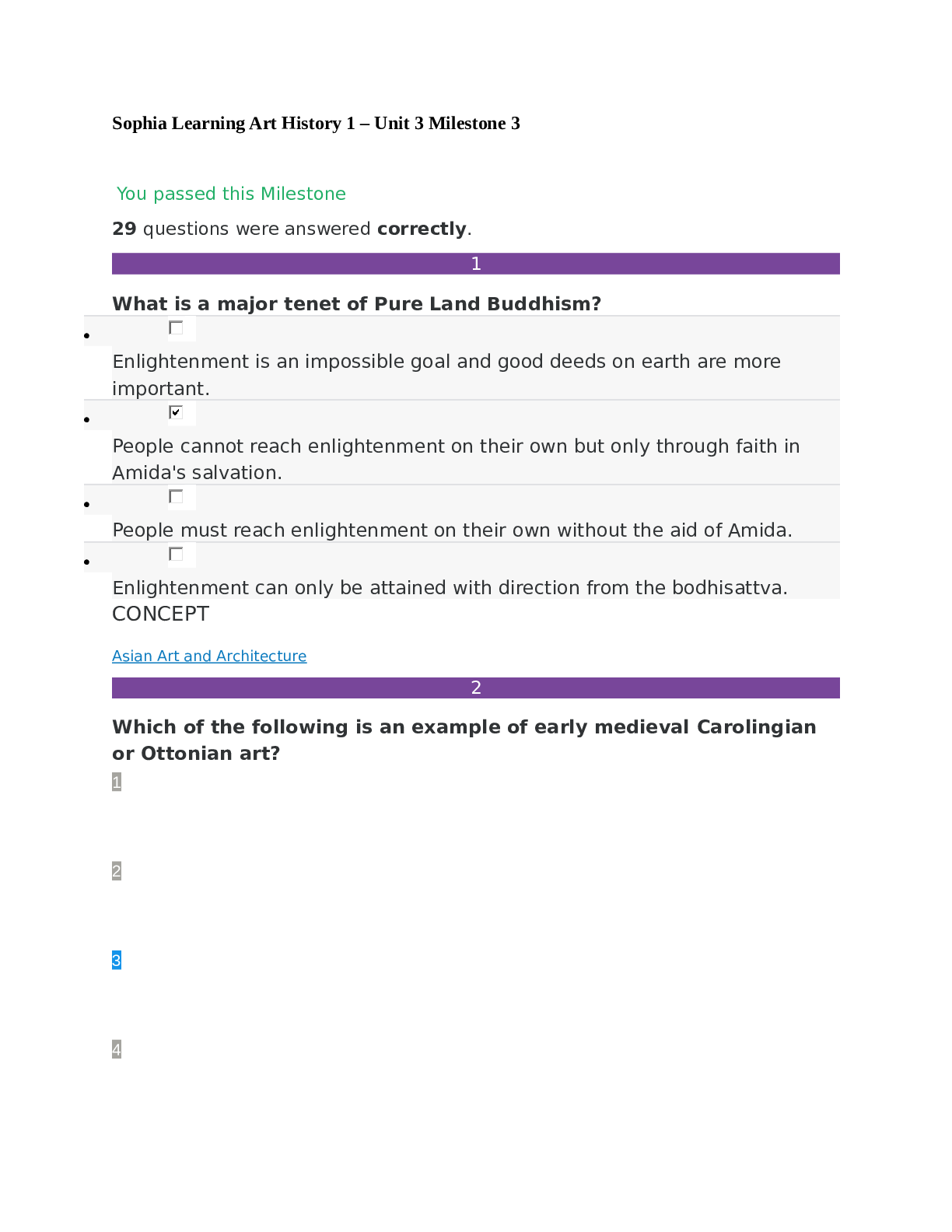
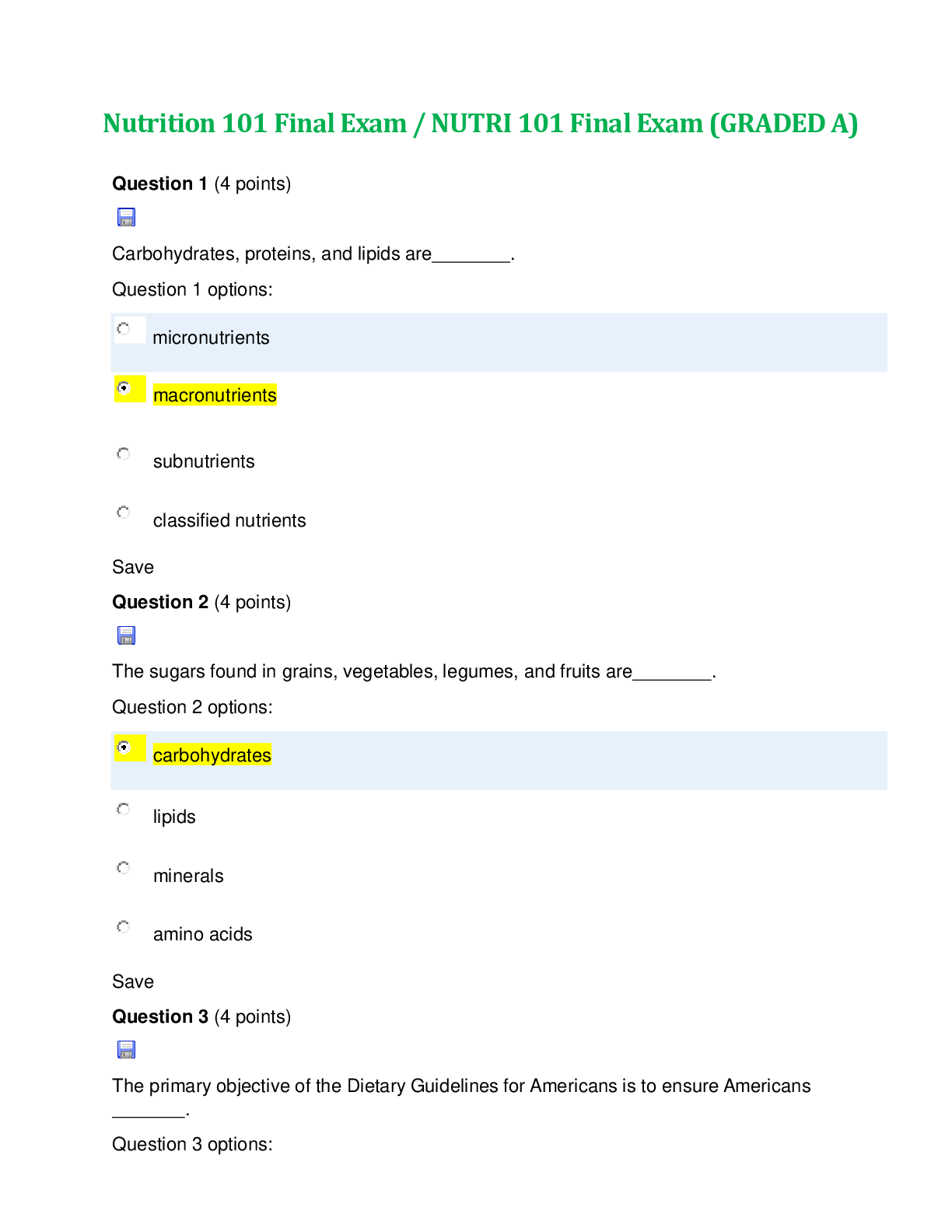
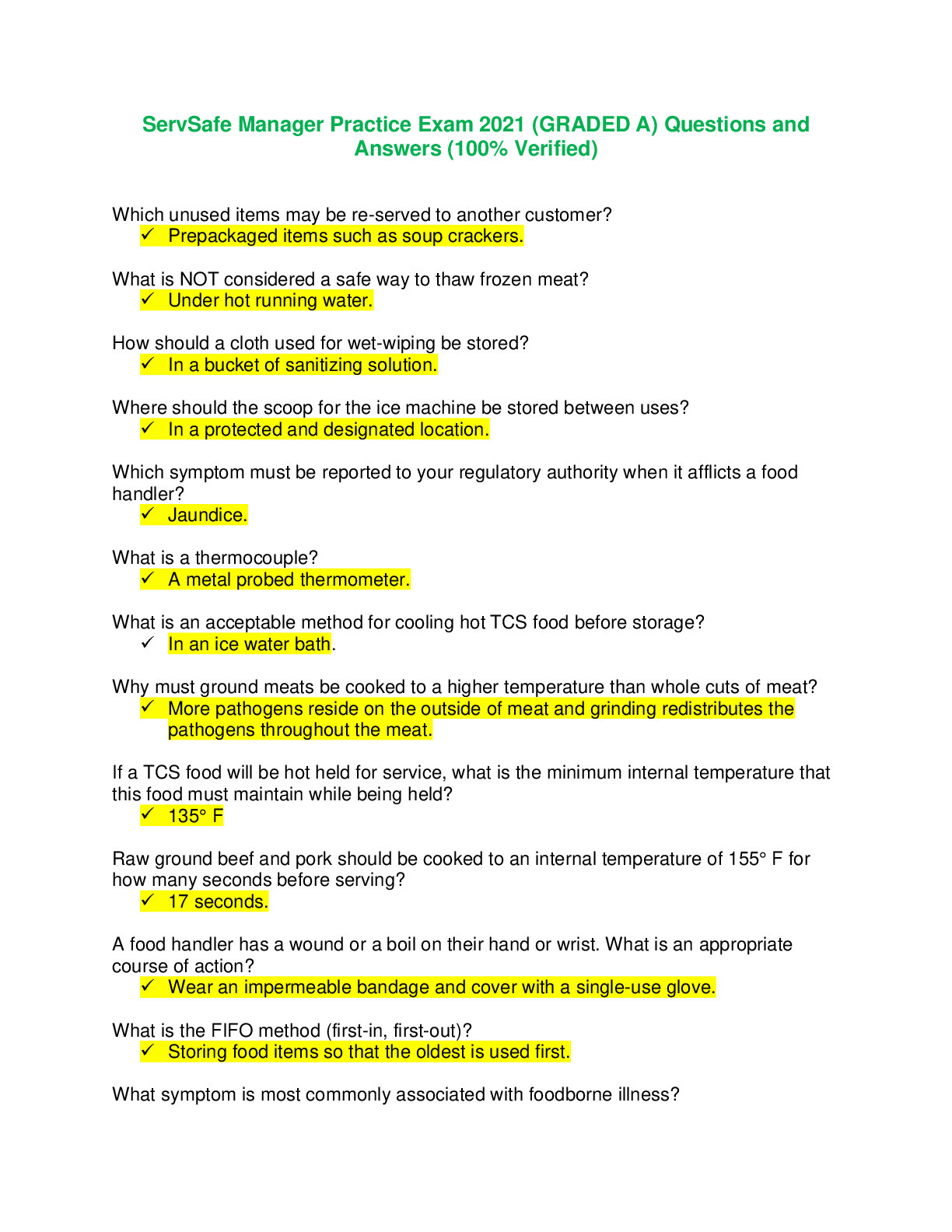
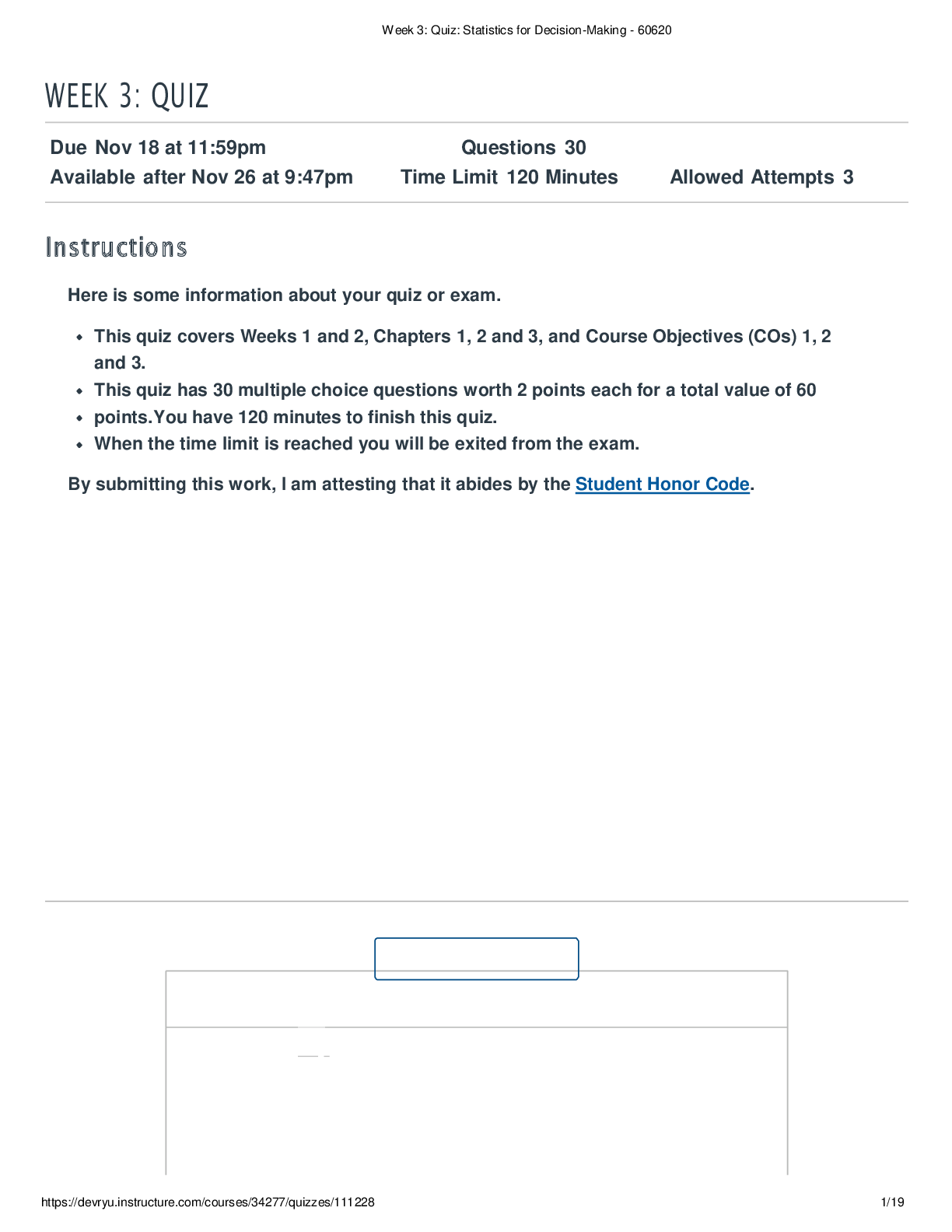
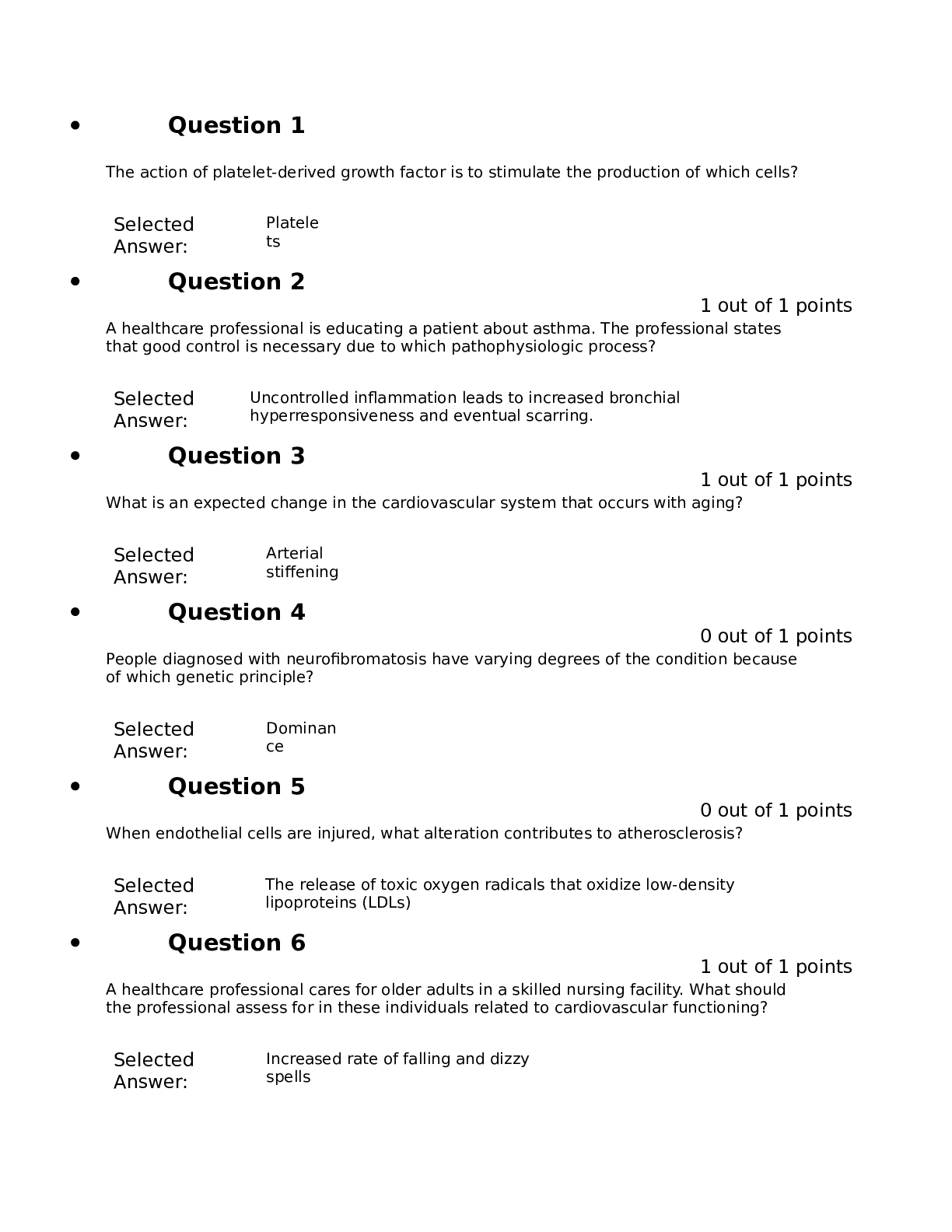
.png)
